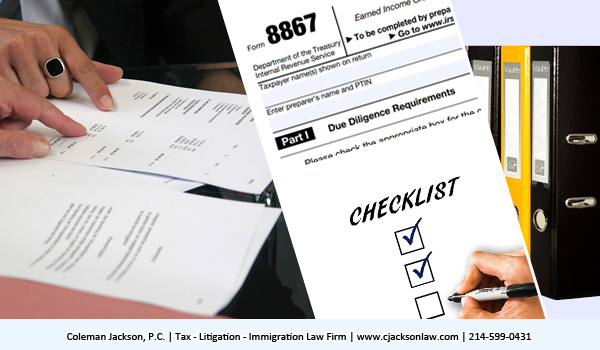By Coleman Jackson, Attorney and Certified Public Accountant
August 10, 2018
Paid Tax return preparers must exercise due diligence when preparing and assisting taxpayers in complying with federal tax laws. Internal Revenue Code Sec. 6695 (g) imposes a civil penalty on paid tax return preparers who fail to comply with due diligence eligibility requirements under the tax statute. Originally, IRC Section 6695(g) only applied to determinations of a taxpayer’s eligibility for the earned income credit (EIC). But the U.S. Congress has gradually amended IRC Sec. 6695 (g) to impose these due diligence eligibility requirements in more and more tax areas. By the 2016 tax filing season, Congress had expanded IRC Sec. 6695(g) due diligence requirements to cover not only earned income tax credit eligibility determinations but also child tax credit eligibility determinations, additional child tax credit eligibility determinations and American opportunity tax credit eligibility determinations. And in late December 2017, Congress expanded IRC Sec. 6695 (g) to cover head of household eligibility determinations. There are civil penalties imposed on paid tax return preparers who violate IRC Sec. 6695 (g).
Under the mandatory paid tax return preparer due diligence requirements of Internal Revenue Code Sec 6695(g), all paid tax return preparers must timely perform the following eligibility due diligence procedures when advising or assisting taxpayers in taking the American opportunity tax credit, earned income credit, child tax credit, additional child tax credit; and for returns filed in 2018, head of household status on any federal tax return:
- Prepare and submit to the IRS with the underlying tax return a due diligence checklist (e.g. Form 8867 or some equivalent eligibility checklist), and keep the checklist for three years. There is a separate penalty under IRC Sec. 6695(g) for failing to prepare the checklist (Form 8867), or for failing to submit the checklist (Form 8867) to the IRS or for failing to keep the checklist (Form 8867) at the tax return preparer’s business establishment for three years.
- Return preparers must have actual knowledge of the taxpayer’s eligibility to qualify for the earned income credit, child tax credit, additional child tax credit, American opportunity tax credit; and for tax returns filed in 2018, head of household filing status. Actual knowledge of the tax return preparer must be based on credible information obtained from the taxpayer or reasonably obtained by the return preparer from some other credible source; such as, information obtained from an educational institution, financial institution or governmental agency. Moreover the actual amount or computation of the applicable credit must be derived from completion of appropriate tax worksheets and be consistent with all applicable guidelines, regulations and rulings of the Internal Revenue Service relating to each credit type, return or refund application rules. There is a separate penalty under IRC Sec. 6695(g) for each and every credit claimed where the tax return preparer lacks or failed to obtain credible knowledge of the facts and circumstances governing a particular taxpayer’s eligibility for a particular credit or head of household filing status. There are also civil penalties associated with failing to complete the computation worksheets or failing to maintain them.
- Tax return preparers cannot ignore obvious facts or turn a blind eye to facts that are reasonably available to them in determining whether a taxpayer is eligible for the applicable credit or tax filing status. Due diligence requires the tax return preparer to ask reasonable questions, look around the trees and not get lost in the forest to make sure tax returns are prepared based on accurate information, complete information and congruent information while accurately applying applicable tax laws pursuant to Treas. Reg. Sec. 1.6695-2T(b)(3). Tax return preparers, must under the Treasury Regulations, establish the identities of the parties (children and parents, for example); the return preparers must establish the relationships between the parties (children and parents, for example); return preparers must establish the taxpayers eligibility for the tax position (head of household, for example); and tax return preparers must determine the correct quantum allowed under the regulations. Paid tax return preparers satisfying these due diligence eligibility requirements are merely acting as an informed reasonable tax return preparer would under like circumstances. There are separate penalties under IRS Sec. 6695 (g) if tax return preparers fail to meet ‘the reasonable and well informed tax return preparer knowledgeable in tax law’ standard of behavior.
- Treasury Regulations implementing IRC Sec. 6695(g) require that the tax return preparer (a) maintain for three years all checklists (Form 8867, for example), (b) maintain all computation worksheets calculating the tax credits, and (c) maintain documentation identifying the source of the information used to establish the eligibility of the taxpayer to claim head of household, the earned income credit, the American opportunity tax credit, the child tax credit, and the additional child tax credit. The tax regulations require that this due diligence documentation be maintain in good form and made available to IRS examiners’ in event of an IRS compliance review of the tax return preparer’s business facilities.
Accumulated IRC Sec. 6695(g) penalties can become substantial monetary burdens for any tax return preparer that lacks and understanding of preparer obligations and responsibilities under U.S. federal tax law; or ignores the rules or otherwise find themselves falling short of expectations under IRC Sec. 6695(g). In recent years, it appears that the U.S. Congress is placing more-and-more responsibilities on paid tax return preparers to improve the quality of overall tax compliance. As this blog points out more and more tax positions are being placed under the Internal Revenue Code Section 6695(g) tax return preparer due diligence umbrella. There is potential criminal exposure to tax return preparer’s under the Internal Revenue Code as well; but, our intent is not to cover criminal violations of the tax code in this particular blog. Watch our blogs for further discussions, like this one. For now we will simply end this blog with our discussion of the civil penalty waiver.
As with other civil penalties under the tax code, penalties assessed under IRC Sec. 6695 can be waived if the tax return preparer can make a credible showing that their tax practice has implemented reasonable procedures to comply with tax rules; that those procedures are consistently and routinely followed and that these current violations of IRC 6695(g) are inadvertent, unintentional and isolated. The basic rules and professional care exercised when documenting, marshaling and presenting any typical reasonable cause defense must be followed when making a credible argument to the agency or courts for waiver of the tax return preparer due diligence penalties under Internal Revenue Code Sec. 6695.
This law blog is written by the Taxation | Litigation | Immigration Law Firm of Coleman Jackson, P.C. for educational purposes; it does not create an attorney-client relationship between this law firm and its reader. You should consult with legal counsel in your geographical area with respect to any legal issues impacting you, your family or business.
Coleman Jackson, P.C. | Taxation, Litigation, Immigration Law Firm | English (214) 599-0431 | Spanish (214) 599-0432





